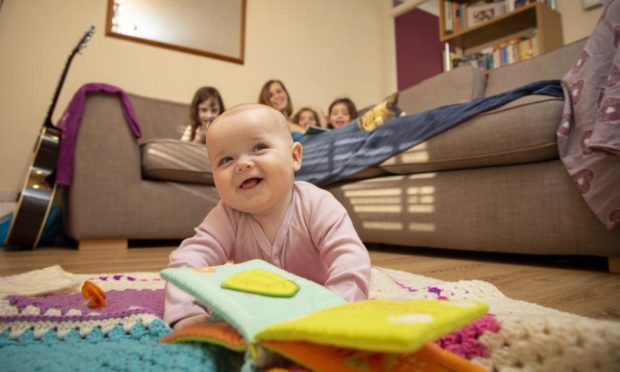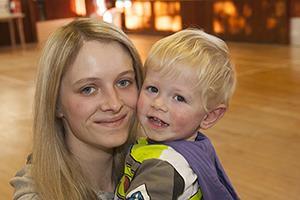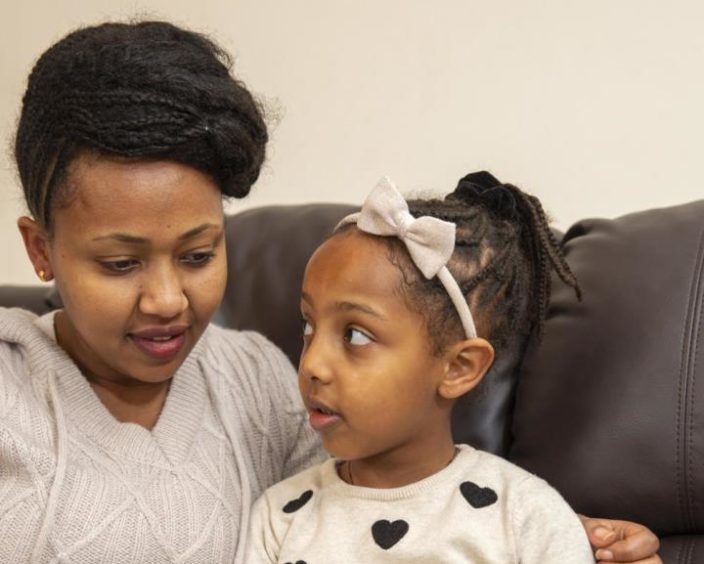Feelings of isolation and loneliness among parents have “dramatically increased” during the pandemic as parents have been cut off from family and friends.
New research by the Royal Foundation found that parental loneliness has increased from 38% before coronavirus to 63%.
Home-Start Aberdeen aims to prevent family crisis and breakdown in vulnerable, struggling families with young children in the city.
Parents supported by the charity say the help has been vital and a lifeline for many of them struggling with loneliness.
A Zoom group is run twice a week to allow them to get together and discuss anything they need to get off their chest.
Jamie Riddoch has had a “tough time” being at home with her son and daughter as her partner works most of the day and the rest of her family are in England.
“I’ve really found it hard this year being cut off from family and friends,” she said.
“With my daughter having ADHD she really struggles with understanding why she can’t see the family and why Muma’s not coming up.
“She’s really struggling and that kind of makes me feel more isolated and more stressed out because she’s not getting to see all the people she would normally get to see.”
Another mum, who doesn’t wish to be named, has been working at an after school club but doesn’t know what she would do without Home-Start.
“Genuinely if it wasn’t for Home-Start I wouldn’t be here,” she said.
The volunteers and the support they provide for mothers is vital in combating isolation among parents.
She added: “I’ve always just keen of been on my own and everyone else has been close. So to me Home-start is like family, that’s what they are.
“I’ve got really close relationships with the mums and the staff and I know they’re always there.”
The newly released research from the Royal Foundation reports that an increase in loneliness for parents in more deprived areas is higher with parents living twice as likely to say they feel lonely often.
Vicky Carter runs some of the support sessions offered by Home-Start and said mental health issues, anxiety and money worries were “amplified” at the moment as this can in turn lead to feelings of isolation.
The absence of physical touch is also a factor in loneliness as even with reduced restrictions, people are unable to hug or touch loved ones.
For parents it is often the small things that are missed the most as they can’t simply drop their child off with someone if they’re sick or need to go to dentist appointment.
Another woman who also attends the Zoom sessions and has recently been able to meet up with her volunteer in cafes.
Being able to meet in person has made a massive difference for Bisi Ishola and her sons, who even call volunteer Jean grandma.
She said: “Aside from that I don’t have any other person I talk to, I don’t have friends. I see her as everything.”
Christmas will be hard for many parents this year who will be separated from family and have to explain to children why they won’t be able to spend it with relatives like they normally do.
Currently Home-Start hasn’t seen an increase in referrals from health visitors and social workers but think this is because they aren’t able to get out and do home visits to the same extent.
Ms Carter said: “We do really worry about what everyone else is up to. How many people have slipped through the net? How many people haven’t felt confident enough to pick up the phone and ask for help.
“If you are feeling lonely, if you are feeling isolated, there’s a huge amount of people in the same situation.
There’s absolutely no shame in reaching out to an organisation, to a neighbour, to a friend – just anybody to let them know how you’re feeling.”
Aberdeen charity supports Royal Foundation early years research
An Aberdeen charity is supporting research released by the Royal Foundation on experiences in early childhood.
The research follows nine years of work by the Duchess of Cambridge on how the root of key social challenges later in life are often found in difficult experiences in early childhood.
Home Start released their own study earlier this year which analysed the impact of the pandemic on new or expecting mothers and say the Royal Foundation data is an accurate picture of their work.
Manager of the Aberdeen branch, Eleanor McEwan, said: “The Royal Foundation and this piece of work they’ve been doing is exactly what Home Start is about.
“The findings about parents mental health is what we’re seeing. A lot of families we support struggle with mental health problems that have gotten worse during the pandemic.
“It is an interesting thing about people being less likely to ask for help – it’s not a sign of weakness to ask for help.
“We all need help from time to time. A problem that’s shared with someone else is easier to manage.”
The published findings have been broken down into the “five big insights”.
Although people overwhelmingly believe that a child’s future is not pre-determined at birth, most don’t understand the specific importance of the first five years of a child’s life.
Parents find it hard to prioritise their wellbeing and feeling judged by others can make a bad situation worse with 70% of parents feeling judged by others.
People were less willing to seek help for how they are feeling even though parental loneliness has dramatically increased during the pandemic.
And while support from local communities substantially increased, not all parents felt this with 33% of parents in the most deprived areas having been less likely to experienced this increased support.
One mother who struggled during the pandemic urged others to ask for help as the support she received from Home Start was a lifeline.
Becca Lilley was shielding with her three-year-old son Alfie in the city but both found it hard to be stuck inside without their usual family support.
She said: “It was horrible – I depend a lot on the company of friends and family so not being able to see anyone wasn’t nice.
“If you feel like you need help don’t be ashamed. I always thought if you need to ask for help then you should feel ashamed but the support has really helped my mental health.
“It’s like a wee community and I’ve made a lot of friends.”
Late intervention to key social challenges such as poor mental health, family breakdown, addiction and homelessness is estimated to cost around £17 billion per year in England and Wales.


